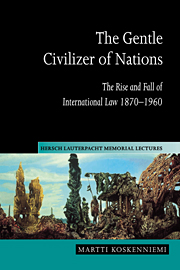Book contents
- Frontmatter
- Contents
- Preface
- List of abbreviations
- Introduction
- 1 “The legal conscience of the civilized world”
- 2 Sovereignty: a gift of civilization: international lawyers and imperialism, 1870–1914
- 3 International law as philosophy: Germany 1871–1933
- 4 International law as sociology: French “solidarism” 1871–1950
- 5 Lauterpacht: the Victorian tradition in international law
- 6 Out of Europe: Carl Schmitt, Hans Morgenthau, and the turn to “international relations”
- Epilogue
- Bibliography
- Index
5 - Lauterpacht: the Victorian tradition in international law
Published online by Cambridge University Press: 06 July 2009
- Frontmatter
- Contents
- Preface
- List of abbreviations
- Introduction
- 1 “The legal conscience of the civilized world”
- 2 Sovereignty: a gift of civilization: international lawyers and imperialism, 1870–1914
- 3 International law as philosophy: Germany 1871–1933
- 4 International law as sociology: French “solidarism” 1871–1950
- 5 Lauterpacht: the Victorian tradition in international law
- 6 Out of Europe: Carl Schmitt, Hans Morgenthau, and the turn to “international relations”
- Epilogue
- Bibliography
- Index
Summary
Tradition in modernity
Less than two months after the capitulation at Munich, on November 16, 1938, Hersch Lauterpacht delivered an address to the League of Nations Union of his new academic home, Cambridge University, on the general subject of the League. He started the address by confiding to his audience that this was a topic on which he felt so strongly as to be unable to trust the “freely spoken word” and that in order to maintain restraint and deliberation, he would read from a manuscript, as was not his custom. Nonetheless, the address departs from Lauterpacht's customary, detached and complicated, somewhat dry English at several points, most notably when, slightly after the middle, he switches over to the first person plural. The address opens with the argument that the events of the 1930s – the Manchurian and Abyssinian Wars, the Munich accords – and the attitudes taken by key League members have meant that the Covenant's collective security provisions, the territorial guarantee (Art. 10) and the obligation of collective response (Arts 15 and 16), have fallen into desuetude. In the fulfillment of its principal objective, the League has failed. All that remains is the hope – asserted without conviction – “that the true spirit of man will assert itself in the long run.”
- Type
- Chapter
- Information
- The Gentle Civilizer of NationsThe Rise and Fall of International Law 1870–1960, pp. 353 - 412Publisher: Cambridge University PressPrint publication year: 2001
- 2
- Cited by



